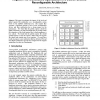Free Online Productivity Tools
i2Speak
i2Symbol
i2OCR
iTex2Img
iWeb2Print
iWeb2Shot
i2Type
iPdf2Split
iPdf2Merge
i2Bopomofo
i2Arabic
i2Style
i2Image
i2PDF
iLatex2Rtf
Sci2ools
87
Voted
FCCM
2005
IEEE
2005
IEEE
Register File Architecture Optimization in a Coarse-Grained Reconfigurable Architecture
This paper investigates the impact of the local and global register file architecture on a reconfigurable system based on the ADRES architecture [3]. The register files consume a significant amount of area on the reconfigurable device, and their architecture has a strong impact on the performance. We found that the global registers should be tightly connected to as many functional units as possible, while the connection of the local register files to their neighbours is less critical. We found that the global register file should contain between 12 and 16 registers, while each local register file should only contain one or two registers. We used these results to propose a new architecture that has between 60% and 95% higher performance per unit area compared to the original architecture over the set of benchmarks.
Related Content
| Added | 24 Jun 2010 |
| Updated | 24 Jun 2010 |
| Type | Conference |
| Year | 2005 |
| Where | FCCM |
| Authors | Zion Kwok, Steven J. E. Wilton |
Comments (0)

